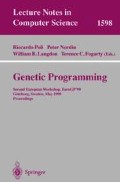Abstract
Genetic Programming can be used to evolve Fuzzy Rulebased classifiers [7]. Fuzzy GP depends on a grammar defining valid expressions of fuzzy classifiers, and guarantees that all individuals in the population are valid instances of it all along the evolution process. This is accomplished by restricting crossover and mutation so that they only take place at points of the derivation tree representing the same non-terminal, thus generating valid subtrees [13].
In Fuzzy GP, terminal symbols are fuzzy constants and variables that are chosen beforehand. In this work we propose a method for evolving both fuzzy membership functions of the variables and the Rule Base. Our method extends the GA-P hybrid method [6] by introducing a new grammar with two functional parts, one for the Fuzzy Rule Base (GP Part), and the other for the constants that define the shapes of the fuzzy sets involved in the Fuzzy Rule Base (GA Part). We have applied this method to some classical benchmarks taken from the collection of test data at the UCI Repository of Machine Learning Databases [9].
Access this chapter
Tax calculation will be finalised at checkout
Purchases are for personal use only
Preview
Unable to display preview. Download preview PDF.
References
Blickle, T. “Evolving Compact Solutions in Genetic Programming: A Case Study”. Parallel Problem Solving From Nature IV. Proceedings of the International Conference on Evolutionary Computation. Voigt, Ebeling, Rechenberg, Schwefel, eds. Springer-Verlag, LNCS 1141. pp 564–573, 1996.
Bonarini, A.: Elf: “Learning Incomplete Fuzzy rule Sets for an Autonomous Robot”. Proceedings of the First European Congress on Intelligent Technologies and Soft Computing (EUFIT ’93), ELITE Foundation, Aachen, D, 69–75. 1993.
Dietterich, T.G.: “Approximate Statistical Tests for Comparing Supervised Classifiers”. Neural Computation, 1998.
Cordón, O., Herrera, F. “A three-stage evolutionary process for learning descriptive and approximate fuzzy logic controllers knowledge bases from examples”. International Journal of Approximate Reasoning, vol 17, no. 4, pp 369–407, 1997.
Cordón, O. Herrera, F., Sánchez, L. “Evolutionary Learning Processes for Data Analysis in Electrical Engineering Applicationes”. Applied Intelligence, No. 10, pp. 5–24. 1999.
Howard L. M., D’Angelo, D. J.: “The GA-P: A Genetic Algorithm and Genetic Programming Hybrid”. IEEE Expert. Vol 10, N. 3, June 1995.
Gegyer-Schulz, A.: Fuzzy Rule-Based Expert Systems and Genetic Machine Learning. Studies in Fuzziness and Soft-Computing. Springer-Verlag. 1996.
Koza, J.: Genetic Programming: on the Programming ofComputers by Means of Natural Selection. MIT Press, 1992.
Murphy, P.M,, Aha, D.W: UCI Repository of Machine Learning Databases. Mantained at the Department of Information and Computer Science, The University of California at Irvine, 1992.
Otero Rodríguez, J., García Carbajal, S. Sánchez Ramos, L.: “Fuzzy Control Applied to a Gas Transport Network In a Siderurgycal Environment”. In Proceedings of 7th. International Conference in Information Processing and Management of Uncertainty in Knowledge-Based Systems I.P.M.U.’98. pp. 403–410. Paris. July, 1998.
Pérez Rodríguez, R.: Fuzzy Rule Learning Using Genetic Algorithms. Ph. D. Thesis. Department of Computer Science and artificial Intelligence. E.T.S. de Ingeniería Informática. University of Granada.
Valenzuela-Rendón, M.: “The Fuzzy Classifier System: A Classifier System for continuosly Varying Variables”. Proceedings of the Fourth International Conference on Genetic Algorithms. Belew, Booker, eds. San Mateo, California. pp. 346–353. 1991.
Whigham, P.A.: Grammatically Based Genetic Programming. San Mateo, California. Morgan Kaufmann Publishers. 1991.
Author information
Authors and Affiliations
Editor information
Editors and Affiliations
Rights and permissions
Copyright information
© 1999 Springer-Verlag Berlin Heidelberg
About this paper
Cite this paper
García, S., González, F., Sánchez, L. (1999). Evolving Fuzzy Rule Based Classifiers with GA-P: A Grammatical Approach. In: Poli, R., Nordin, P., Langdon, W.B., Fogarty, T.C. (eds) Genetic Programming. EuroGP 1999. Lecture Notes in Computer Science, vol 1598. Springer, Berlin, Heidelberg. https://doi.org/10.1007/3-540-48885-5_17
Download citation
DOI: https://doi.org/10.1007/3-540-48885-5_17
Published:
Publisher Name: Springer, Berlin, Heidelberg
Print ISBN: 978-3-540-65899-3
Online ISBN: 978-3-540-48885-9
eBook Packages: Springer Book Archive

